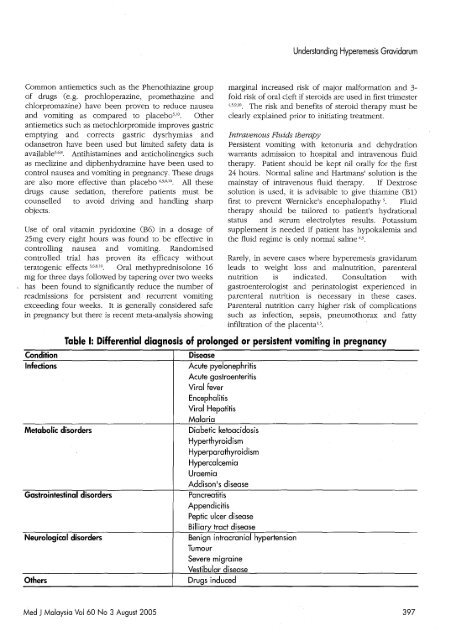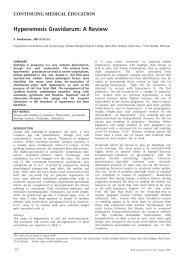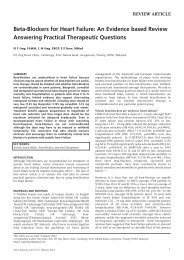Understanding Hyperemesis Gravidarum - Medical Journal of ...
Understanding Hyperemesis Gravidarum - Medical Journal of ...
Understanding Hyperemesis Gravidarum - Medical Journal of ...
You also want an ePaper? Increase the reach of your titles
YUMPU automatically turns print PDFs into web optimized ePapers that Google loves.
Common antiemetics such as the Phenothiazine group<br />
<strong>of</strong> drugs (e.g. prochloperazine, promethazine and<br />
chlorpromazine) have been proven to reduce nausea<br />
and vomiting as compared to placeb0 5 ,1O. Other<br />
antiemetics such as metochlorpromide improves gastric<br />
emptying and corrects gastric dysrhymias and<br />
odansetron have been used but limited safety data is<br />
available 5 ,6,8. Antihistamines and anticholinergics such<br />
as meclizine and diphenhydramine have been used to<br />
control nausea and vomiting in pregnancy. These drugs<br />
are also more effective than placebo 4,5,6,10, All these<br />
drugs cause sedation, therefore patients must be<br />
counselled to avoid driving and handling sharp<br />
objects,<br />
Use <strong>of</strong> oral vitamin pyridoxine (B6) in a dosage <strong>of</strong><br />
25mg every eight hours was found to be effective in<br />
controlling nausea and vomiting. Randomised<br />
controlled trial has proven its efficacy without<br />
teratogenic effects 5,6,8,10, Oral methyprednisolone 16<br />
mg for three days followed by tapering over two weeks<br />
has been found to significantly reduce the number <strong>of</strong><br />
readmissions for persistent and recurrent vomiting<br />
exceeding four weeks. It is generally considered safe<br />
in pregnancy but there is recent meta-analysis showing<br />
Condition<br />
Infections<br />
Metabolic disorders<br />
<strong>Understanding</strong> <strong>Hyperemesis</strong> <strong>Gravidarum</strong><br />
marginal increased risk <strong>of</strong> major malformation and 3fold<br />
risk <strong>of</strong> oral cleft if steroids are used in first trimester<br />
4,5,9,10. The risk and benefits <strong>of</strong> steroid therapy must be<br />
clearly explained prior to initiating treatment.<br />
Intravenous Fluids therapy<br />
Persistent vomiting with ketonuria and dehydration<br />
warrants admission to hospital and intravenous fluid<br />
therapy, Patient should be kept nil orally for the first<br />
24 hours. Normal saline and Hartmans' solution is the<br />
mainstay <strong>of</strong> intravenous fluid therapy, If Dextrose<br />
solution is used, it is advisable to give thiamine (B1)<br />
first to prevent Wernicke's encephalopathy 5. Fluid<br />
therapy should be tailored to patient's hydrational<br />
status and serum electrolytes results. Potassium<br />
supplement is needed if patient has hypokalemia and<br />
the fluid regime is only normal saline 4,5.<br />
Rarely, in severe cases where hyperemesis gravidarum<br />
leads to weight loss and malnutrition, parenteral<br />
nutrition is indicated. Consultation with<br />
gastroenterologist and perinatologist experienced in<br />
parenteral nutrition is necessary in these cases.<br />
Parenteral nutrition carry higher risk <strong>of</strong> complications<br />
such as infection, sepsis, pneumothorax and fatty<br />
infiltration <strong>of</strong> the placenta l ,5.<br />
Table I: Differential diagnosis <strong>of</strong> prolonged or persistent vomiting in pregnancy<br />
Gastrointestinal disorders<br />
Neurological disorders<br />
Others<br />
Med J Malaysia Vol 60 No 3 August 2005<br />
Disease<br />
Acute pyelonephritis<br />
Acute gastroenteritis<br />
Viral fever<br />
Encephalitis<br />
Viral Hepatitis<br />
Malaria<br />
Diabetic ketoacidosis<br />
Hyperthyroidism<br />
Hyperparathyroidism<br />
Hypercalcemia<br />
Uraemia<br />
Addison's disease<br />
Pancreatitis<br />
Appendicitis<br />
Peptic ulcer disease<br />
Billiary tract disease<br />
Benign intracranial hypertension<br />
Tumour<br />
Severe migraine<br />
Vestibular disease<br />
Drugs induced<br />
397









